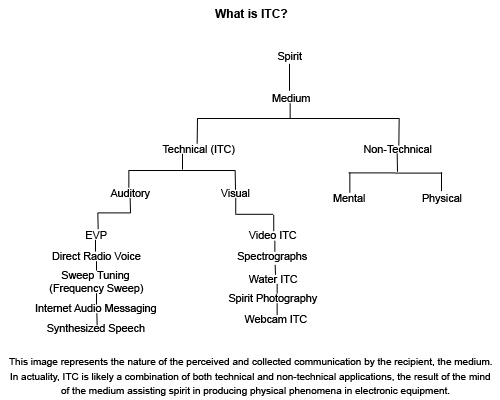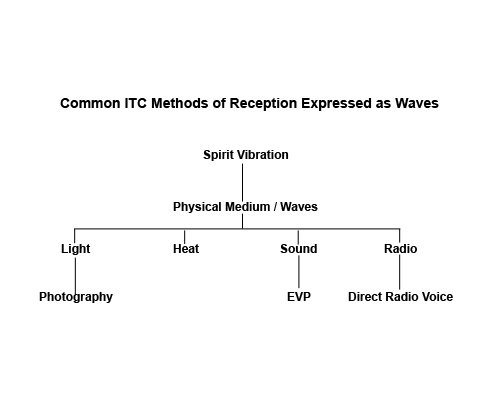
What is ITC?
ITC is an abbreviation for the term Instrumental Trans- communication. The term describes communication with non-physical entities through electronic devices. According to WorldITC.org "ITC is the use of tape recorder, TVs, radios, computers, telephones, and other technical devices with the intent to get meaningful information from beyond in such forms as voices, images, and text."
ITC is used to define a field of research in which people, many referred to simply as "experimenters", use a variety of electronic devices and technology to communicate with spirit. The most common medium through which this is expressed today is audio, in the form of EVP (electronic voice phenomena). Generally, if it was recorded or collected in any fashion whereby an electronic device was used or helped to facilitate the contact, it is labeled ITC.
ITC is usually conducted with a specific intent on behalf of both parties. Rather than just collecting evidence as an uninvolved observer, most ITC experimenters have had experiences which lead them to be very confident of the reality of life after death. Instead of always labeling phenomena as puzzling and happenstance, many instances of ITC communication are well-documented and verified. In the best cases, ITC evidence can be described as a record of communication between man and spirit. Specific information is given, facts are verified, and personalities are confirmed. The only thing mysterious that remains are unanswered questions in relation to the mode of communication rather than the contents of the actual communication itself.
ITC is also defined as a method of communication. Nowadays it is recognized as a form of mediumship which is not yet fully understood. In some fashion the experimenter plays a psychic role in the facilitation of communication through equipment. It can be thought of as a form of creation whereby the mind and inherent psychic abilities of the experimenter/medium play a part in the manifestation of phenomena in electronic devices.
How Was it Named?
According to AAEVP NewsJournal, Coining the Term, "ITC", Winter 2008, this term was coined by Dr. Ernst Senkowski in the late 1970's/early 1980's. Dr. Senkowski is a well-known figure in the field of ITC who has contributed much of his time and effort towards understanding and working with ITC.
Dr. Senkowski stated: "It is not possible to give an exact date of my coining the term 'ITC.' It was sort of a process that started during the early 1980s when I looked for a suitable description of my EVP work. As a long-time radio ham operator, I used (only for myself!) the German neologism transfunk with trans (for beyond) as opposed to CIS (our side), and funk for 'radio' or 'wireless.' As far as I can remember, I found the word 'Transfunk' on my tapes."
"Some time later, I considered this too special so I introduced the more general term transcommunikation, adding instrumentell to discern it from the pure mediumistic activites. This happened during the later 1980s so that I could use it in the first edition of my book Instrumentelle Transkommunikation that appeared in 1989."
He continues: "I should like to add a few remarks: In the eighties it was not so clear as it seems to be now. Apparently the electronic devices are of secondary importance - the main component of ITC is psychic - without a possibility to separate the 'mind' or 'spirit' of the terrestrial operator from that of an entity in the beyond. The best way out seems to consider ITC as a psychic activity from both sides."
Dr. Senkowski adds: "There is another problem I have difficulty to understand from ITC, but in my understanding ITC is a superordinate concept comprising of all sorts of electronic means and forms of contents (voices, images, computer texts). It may be that for many people the voices are easier to accept, and the other forms 'far out,' but basically there is no difference."
In other countries you will find Instrumental Transcommunication spelled differently. They are as follows:
Germany - Transkommunication
Brazil - Transcomunicação
Spain - Transcomunicação Instrumental (TCI)
France - Transcommunication Instrumentale (TCI)
Editor's note: Perhaps it was websites such as this one, ITC Bridge, that lent to the erroneous classification and reference of EVP/ITC as concurrent fields by experimenters. In my earlier days (not too long ago!) I created the first ITC Bridge website as my first experience in website building. Not knowing any better, and being inexperienced in this task, I created navigation bars that read: EVP, ITC, DRV. The website was created in a manner that also did not lend itself to easy maintenance, and after I became aware of my faux-pas I intended to fix it, but it took several years. This mistake has since been corrected in the new ITC Bridge website.

ITC as Waves.
There are many different ways to think of ITC. When you think of things in a different light, a potential grows for creative thinking and experimenting. In my work, sometimes I like to think of the mediums through which spirit communicates as waves.
The picture on the left demonstrates several of the general ways in which spirit communication uses waves in ITC. The most common is sound, in the form of evp, with light following a close second. When you see spirit in a still photograph, you are seeing a physical manifestation of spirit's influence upon light waves. When you hear an evp, you are hearing the physical manifestation of spirit's influence on an audio wave. When spirit comes through your radio, it is the physical manifestation of spirit's influence upon radio waves (electromagnetic radiation) which is then converted to sound via electronics.
For more information on the history of ITC, please visit the following links:
Mark Macy: The Phenomenal History and Future of ITC Research
Dr. Ernst Senkowski: Instrumental Transcommunication - A Review
